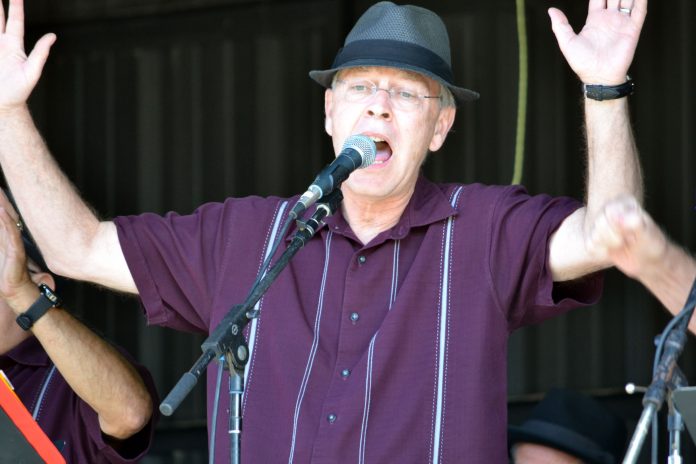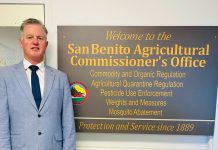Steven Sanders is exceptional at a couple of things: working really hard and singing really cool—doo-wop cool.
Hard work was a family tradition, as both his grandfather and father were sugar beet harvesting contractors on farms in the Central Coast region. The singing was just something he did for the fun of it in school and it has been an important part of who he is ever since. No matter where his professional career took him, from farming to practicing the law, he always had his singing.
A child of the 50s and a teen of the 60s, his musical taste evolved as he did, and now it has mysteriously regressed back to the 50s as he and several other mature men stroll, bob and weave as they harmonize and do-wop their way through classics from Little Anthony and the Imperials, Shep and the Limelites and The Flamingos.
When he isn’t wearing his purple pinstriped shirt with a fedora balanced precariously on his head as he sings before crowds, he’s wearing a long black robe dispensing justice to individuals as the Honorable Judge Steven Sanders of the San Benito County Superior Court.
Sanders’ rise to the bench
Appropriately, he was born on Flag Day, 1955, in Salinas. Five years later, he was trailing behind a wagon in the fields picking up stray sugar beets. His grandfather wrote his first paycheck for $5. Sanders said it felt like he was more in the way than working, but it was a good day when he cashed that first check.
“My grandfather and dad worked in agriculture, and my mom was a teacher’s aid,” he said. “My grandfather came to Salinas in the 40s as a migrant farm worker from Texas. My grandmother came out from Oklahoma and her dad worked in the shipyards in Portland, Ore., during World War II. Then he moved down to Salinas. My dad was born in Salinas and I grew up there and went to North Salinas High.”
He describes himself as a good student in high school. He said his parents were the first to graduate high school, and he was the first in his family to attend college. In high school, he found an affinity for two things: politics and singing, and he’s stayed involved in both.
“I’d have loved to be more involved in basketball, but, frankly, I wasn’t that good or tall enough,” he said.
Sanders went to the University of California, Davis for undergraduate studies in biology. He quickly learned long hours in science labs weren’t for him and ultimately shifted his focus to mass communications, with an emphasis in sociology. Along the way, he accumulated enough credits in environmental science and Spanish for a minor. But UC-Davis didn’t offer minors in those topics, so he considers his college years as “well rounded.”
He worked with the Legal Aid Society while writing his senior thesis, which the organization used to garner funding, and he continued his studies at the University of the Pacific’s McGeorge School of Law in Sacramento where he received his doctorate in law in 1983.
“That was the same year my daughter was born,” he said. “Bad timing, I suppose. She was born in April. I got my degree in July. Luckily, my wife had just enough time on her job to take a couple of months’ maternity leave. Then she worked half-time and I was able to study for the bar exam. And while she worked, I’d watch our daughter and study in the evenings. It actually worked out quite well.”
He worked his way through college and law school. In college, he worked in the school dining hall washing dishes, advancing to serving food and, finally, student manager.
“The money helped as a young, married student,” he said. “And I could eat there.”
His said his work ethic is simple—work hard.
“My family was of modest means, so I paid my way through college from my junior year on,” he said. “My father instilled in me, ‘You can do anything you want to do as long as you put your mind to it and work hard.’ He said agriculture is a tough life, and if I can do something other than back-breaking work, it would be better for me.”
As a law clerk, he worked for a personal injury firm in Sacramento. When he began looking for a law practice to work for after receiving his degree in 1983, he chose Rusconi, Foster, Thomas & Pipal, a general practice firm in Hollister. The firm had the county counsel contract.
“Right about the time I came, the county decided to abandon the use of DAs as county counsels,” he said. “Dave Pipal was a former DA and county counsel and they contracted with our firm to bridge the gap as they were looking to hire their county counsel. So, I began working with the county in 1984. I prosecuted mostly dependency (child abuse) cases and worked on planning issues. The first county counsel was hired around the end of the year and we stopped doing that work. He lasted about eight months and we got the contract again until about 1987, when the city decided to take on the job yet again.”
Sanders tossed in his bid for the position and was appointed in 1987, and served the county until he took the bench as a judge in 2001.
“Being a judge wasn’t necessarily a goal of mine,” he said. “But I liked the aspect of my job as county counsel of resolving disputes and being an advocate. But I really liked doing justice in the role of a judge where every case is important.”
He said San Benito is one of the five busiest courts in the state because it’s the largest county with only two judges. Typically, he handles 140 to 150 cases each day, ranging from traffic infractions to felonies. He said he is not unsympathetic toward those who come before him.
“It’s sad that a person has been convicted of a crime and it’s sad that there is a victim,” he said. “But it’s not unlike medicine. When somebody’s ill, it’s sad for that person and their loved ones. I see the parallels between law and medicine.”
‘Singing helps’
He said he has to work at not becoming jaded, and that’s where the singing comes in.
“You have to have a life beyond the bench in order to be effective,” he said. “You need to be able to release stress. I’m constantly thinking about cases and what I could have done differently. Singing helps.”
He began singing in high school and has been dabbling in it ever since. While standing before an audience to sing doesn’t faze him, theater terrifies him.
“My daughter was in the San Benito Stage Company production for ‘Godspell’ and I was asked to do a walk-on,” he said. “It scared me to death, but it was fun. I always try to do things to challenge myself. Now I sing as part of a group, the Hollister Flashbacks, which does doo-wop songs. The core group that formed it came from the Oriana Chorale. I sang with them for about 12 seasons.”
When interviewed, he said the Flashbacks recently sang at the Hollister Farmers Market and had been scheduled to sing at the San Benito County Fair and San Benito Olive Festival.
He’s one of the two tenors in the group that sings memorable songs like, “Who Put the Bop in the Bomp Shoo Bop” and “At the Hop.”
“Some of our lyrics are ‘doo-wop, doo-wop, doo-wop,” he laughed. “Really good stuff. People love them because they’re tried-and-true rock and roll. Even the kids like the beat. It’s a nice diversion.”
Sanders can’t seem to stand still. In addition to seeing hundreds of cases a week, singing at county fairs, and woodworking, he also teaches.
“I’m the professor of law at Monterey College, where I teach one night a week,” he said. “I’ve been doing that for 10 years. My wife went back to school to get her teaching credentials, my son was at Cal Poly and my daughter was at UC Davis, so I was all alone. So, I started to teach civil procedure.”
He’s been on the bench 14 years and he’s not about to give up the law, just yet.
“One of the things I started a few years ago is education court,” he said. “It’s a partnership between the courts and probation that requires some felons to go to a library program to read with their children to improve literacy. We’re in the process of developing a parental accountability court that will focus on folks who perhaps aren’t paying enough attention to getting their kids the necessary schooling they’re supposed to do. So the DA may be prosecuting some parents who don’t get their children to school or are truant.”
He said he is going to dedicate a calendar similar to a drug court model where those parents would have to appear periodically to monitor the progress of their children.
“It’s a major concern,” he said. “The currency of our society is literacy. There is a limited window that children have to expand their potential. At some point of time, depending on what your environment is, your brain picks what’s important to use. So if you’re not exposed early to reading, their capacity to learn is reduced.”
He said a number of agencies have come together in a collaboration.
“The idea is to focus on parenting,” he said. “People generally love their children, but sometimes encouragement is necessary because they don’t understand the importance of some of these things. If the prosecution brings cases against them, I’m going to open up a dedicated court to produce results. I’m hopeful we’ll be seeing the truancy component in a few months. We’re still seeking funding, so we’ll start small.”










